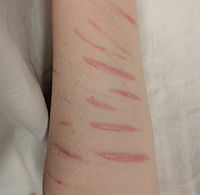
Photo from wikipedia
Previous research has indicated that both self-criticism and parental criticism may be associated with engagement in nonsuicidal self-injury (NSSI). However, much less is known about the temporal sequencing of these… Click to show full abstract
Previous research has indicated that both self-criticism and parental criticism may be associated with engagement in nonsuicidal self-injury (NSSI). However, much less is known about the temporal sequencing of these relationships (i.e., do self-criticism and parental criticism predict NSSI across time, or does NSSI predict self-criticism and parental criticism across time?). Undergraduate students (N = 1132; 70.5% female; Mage = 19.06) from a midsized Canadian university completed measures of NSSI, self-criticism, maternal criticism, and paternal criticism at two time points (one year apart). An autoregressive cross-lagged path analysis revealed that there was a significant unidirectional relationship between NSSI and self-criticism, such that greater NSSI frequency predicted greater self-criticism across time, but self-criticism did not predict greater NSSI frequency across time. In addition, both maternal and paternal criticism were not significantly associated with NSSI frequency when examining either direction of effects. Overall, our results challenge the notion that self-criticism is a risk factor for NSSI engagement, and instead, suggest that it may be a consequence of NSSI engagement. Intervention programs may benefit from recognizing that individuals who engage in NSSI may subsequently criticize themselves.
Journal Title: Psychiatry Research
Year Published: 2019
Link to full text (if available)
Share on Social Media: Sign Up to like & get
recommendations!